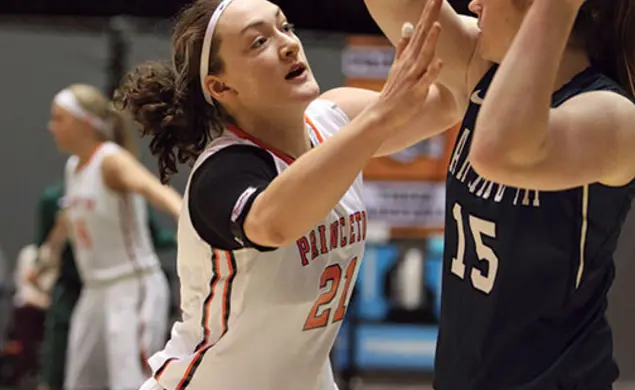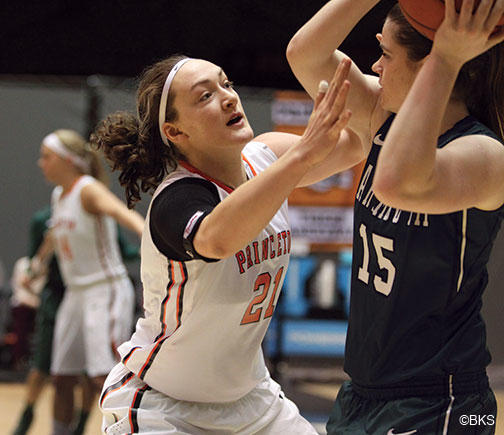Extra Point: Have You Heard About the Tigers? Women’s Basketball Earns National Notice
 Alex Wheatley ’16 and the Tigers have held opponents to an average of 52 points per game.
Alex Wheatley ’16 and the Tigers have held opponents to an average of 52 points per game.The day before February’s Academy Awards ceremony, SportsCenter turned its college basketball highlights into a faux-Oscars show, including a category for Best Basketball in the Ivy League that pitted the first-place Harvard men against the undefeated Princeton women. The winner? The Tigers, of course. All they do is win.
The ESPN segment was the latest laurel for head coach Courtney Banghart’s team, which, during its record-setting run, has received a halftime visit from first lady Michelle Obama ’85 (her niece, Leslie Robinson ’18, is a reserve forward); a hat-tip from John Calipari, coach of the unbeaten Kentucky men’s team; a postgame talk by Bill Bradley ’65; and feature stories in The New York Times, USA Today, and The Wall Street Journal, to name a few.
Perhaps more importantly, the Tigers have earned the respect of national pollsters, reaching No. 14 in the Associated Press poll on Feb. 23. That should translate into a favorable seeding for a team aiming for its first NCAA Tournament win. (At press time, Princeton had a two-game lead in the Ivy title race with five games remaining.)
In the past, the best Ivy teams have had a clear leading scorer, such as Princeton’s dynamic forward Niveen Rasheed ’13 or Harvard star Allison Feaster, who led the Crimson’s upset of Stanford in the 1998 NCAA Tournament. This year’s Tigers have at least four players who can fill that role: Guards Blake Dietrick ’15 and Michelle Miller ’16 and forwards Alex Wheatley ’16 and Annie Tarakchian ’16 each average more than 10 points per game.
“On offense, the scoring can come from anywhere, and then defensively, they really lock things down,” said Mel Greenberg, a former Philadelphia Inquirer columnist and Women’s Basketball Hall of Fame inductee. “It’s just a great, balanced team.”
Defense, in Banghart’s assessment, was Princeton’s fatal flaw last year, when the team fell one game shy of a fifth consecutive Ivy title. But that weakness has become a strength: Through 25 games, the Tigers ranked third in the nation in field-goal-percentage defense, holding opponents to 33.6 percent shooting.
The change has come partly from training and partly from confidence, according to Dietrick. “We work on defense every day at practice, but I think it’s mostly just holding each other accountable to a higher standard and expecting 100 percent effort and focus all the time,” she said.
Effort and focus, talent and depth — whatever the reasons, it’s been one unforgettable season. And the biggest games are still to come.
The Latest
See all







